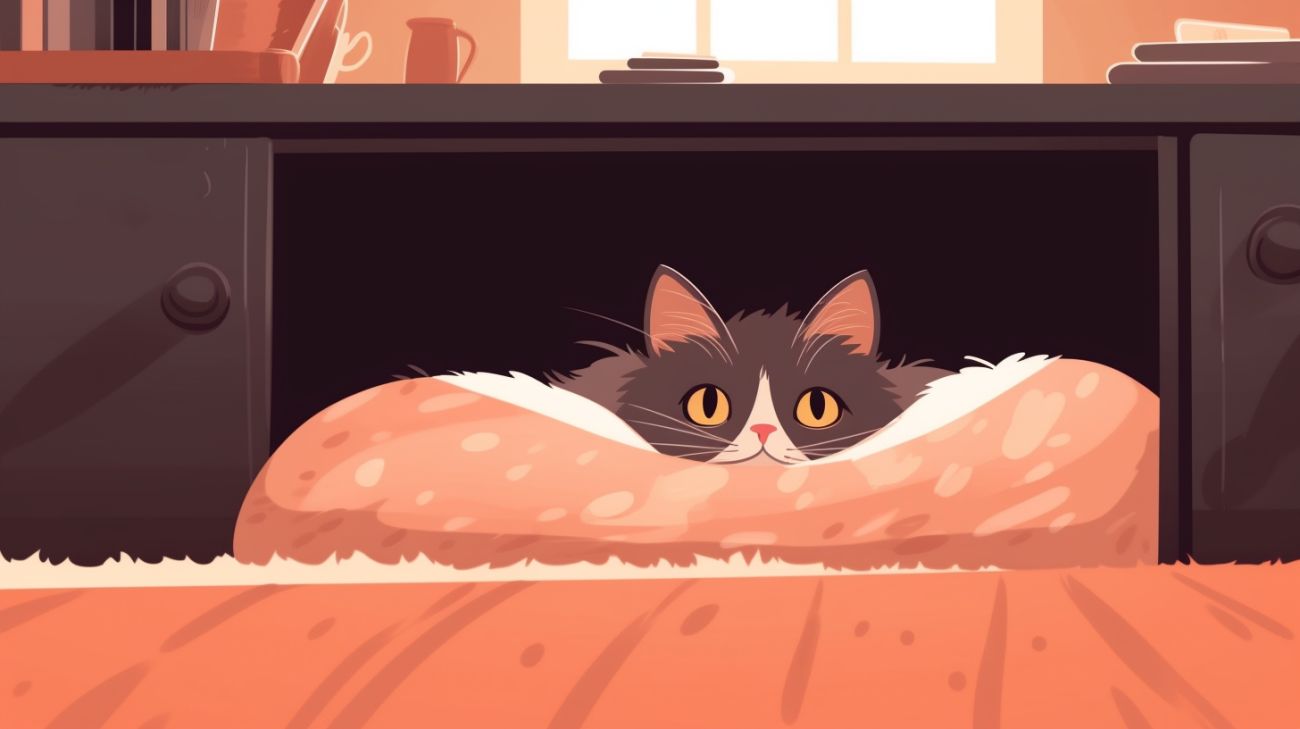Key takeaways
Without food, a cat can survive for two weeks. However, without water, a cat can only survive for three days (source).
Our pets hide and refuse to eat for various reasons. This can include being sick or injured, pregnant, or scared.
There are ways to lure your cat out of hiding to ensure they get the care and help they need. These include leaving familiar-smelling food and blankets outside and keeping noise and disruption around the house to a minimum.
We’ll be exploring the essential facts and offering expert advice so every cat owner will feel they can take good care of their fur baby.
Quick Navigation
How long can a cat hide without eating?
"It's important to recognize the word 'survive.' Although they will stay alive, they'll likely develop medical conditions and live a low-quality life if they go too long without eating."

Why do cats hide?
They are sick or injured

They are pregnant

They are scared
Loud noises
New visitors
New pets
Change of food
Moving house
Why do cats refuse to eat?
They are in pain
They are distressed
Underlying disease

How to lure your cat out of hiding
If they're hiding indoors
Avoid having visitors over: Even if your kitty is used to having visitors over, when they are feeling stressed and hiding, it's best to keep the house a safe place with people they trust. Avoid parties and gatherings or having small children over.
Keep noise to a minimum: Having the radio on quietly can be comforting to some animals, but make sure you don't play loud music or instruments. It's also worth chatting with your neighbors and asking them to keep the noise down for a week or so if they can.
Keep them company: While you may think letting your furry friend have their privacy is best, it's also important to keep them company. They need to know that they can trust you and that you are there for them. It's also a good opportunity to observe their behavior to try and find out why they are hiding.
Keep feeding them: If they refuse to eat, keep offering them different types of fresh food and treats. When my cat was sick, I tried everything. Eventually, it was hand-feeding her butter that made her well enough to eat normal cat food again! Make sure you bring them a bowl of water that's regularly changed as well.

If they're hiding outdoors
Open up the doors and windows: Cats have incredible homing abilities thanks to their fantastic hearing and an even better sense of smell. If you open up the doors and windows of your house, it will make it easier for them to recognize the familiar sounds and smells and locate the house when they want to come out of hiding.
Leave litter boxes, blankets, and their food bowl outside: Another effective trick to tap into your cat's smelling superpower is to leave their litter box outside. Cats are very territorial and will recognize a scent from up to 4 miles (6.5km) away! Blankets that they have slept on regularly and their food will also help.
Keep noise and disruption to a minimum: The fewer cars going back and forth from your house, the better, so keep visitors to a minimum. This also goes for building work and loud music.
Sheds
Garages
Outbuildings
Trees
Bushes and hedges
Under cars
In fields
In neighbors' houses and gardens
Nearby farms (this is where we found my senior kitty)
"When my cat was sick, I tried everything. Eventually, it was hand-feeding her butter that made her well enough to eat normal food again!"

FAQs
What does it mean when a cat hides and doesn't eat?
When a cat hides and doesn't eat, it can mean a few different things. Often it means your cat is injured or sick, so it's important to find them and observe their behavior. It can also mean your cat may be pregnant.
How long is too long for a cat to hide?
If your cat is hiding and not eating, then it's important to try and encourage them to come out. Cats can survive two weeks without food but only three days without water. So any longer than 48 hours is too long to hide.
How long will a lost cat hide if scared?
A lost cat will normally hide for around 24 hours if they are scared. After this, their adrenaline will start to wear off, and they'll begin to navigate their way home. However, if your cat is sick or injured, or you've recently moved house, your cat may hide for longer. Be sure to start searching immediately.
How long can a cat hide without food and water?
A cat can hide without food for two weeks but without water for only three days. This means it's important you start searching for your cat immediately and encouraging them to come out of hiding. If they are hiding indoors, keep bringing them different food, treats, and water.
What are four signs your cat is suffering?
The four main signs that your cat is suffering are:
Refusing to eat or drink
Hiding
Acting withdrawn or lethargic
Refusing to be touched[[/faq-answer]]
Should I disturb a hiding cat?
A hiding cat is usually a sign of distress, so it's difficult to know whether you should disturb them or not. Keeping them company is important so you can observe their behavior and make sure they aren't sick or injured. Bring them food, treats, and water, but also make sure you give them space.
Will a cat come out of hiding?
A cat will often come out of hiding when they feel it is safe to do so. However, if they are sick or injured, they may not come out until you find them. For this reason, you should be proactive if your cat goes missing and start searching immediately.
How do you find a hiding cat?
To find a hiding cat, you need to thoroughly search indoors and outdoors. In your house, search under furniture, in appliances, in wall cavities, and in drawers and cupboards. Outside, search sheds, garages, gardens, trees, and under cars. It's also worth leaving food, litter boxes, and blankets outside to lure your cat home.



